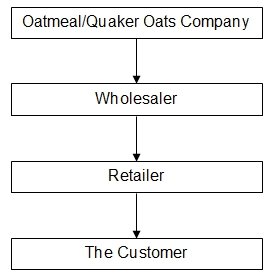The world of marketing channels is a dynamic and ever changing place that offers some of the most exciting challenges known to business professionals. Whenever a new opportunity to make money appears, a new marketing channel is often created. In some fast changing markets, business possibilities emerge so rapidly, radically transforming the distribution channels. Often times, this is so frustrating for channel managers, who must decide which channels are correct for their company, product, and market places.
A distribution channels are a group of people and firms involved in the transfer of title or ownership as the product moves from the producer to the ultimate consumer. The American Marketing Association describes a distribution channels as the structure of intra company organization units and extra company agents, dealers, wholesalers and retailers through which a commodity, product or service is marketed (Havaldar and Cavale, 2006).
In short, distribution channels are nothing but intermediaries or middlemen between the producer and the consumer. Distribution channels are there because the producers can not reach all their customers. They help to multiply reach and provide efficiency to the marketing process. Furthermore, they have the core competence and the reach which a company may not have and they can do this entire process more cost effectively.
According to Havaldar and Cavale (2006), distribution channels can broadly be classified as follows:
Sales Channel
This has the function of motivating buyers, sharing information between the consumer and company, negotiating fair bargains for the consumer, and financing the transactions. A distributor for Oatmeal/Quaker Oats Company would perform all these functions for the company by dealing with retailers and wholesalers who stock and sell the company products.
Delivery Channel
This is regarded as the primary job of a clearing and forwarding company and, is typically meant for physical transactions only. A clearing and forwarding company for Oatmeal/Quaker Oats Company would ensure that the orders received from the company for the company distributors would be physically delivered to them on time and in full. The clearing and forwarding company would also receive and stock the company products for distribution.
Service Channel
This is mainly concerned with the after sales service. This will ensure that Oatmeal/Quaker Oats Company is able to address any issues brought up by clients after the actual distribution has taken place.
A number of distribution channels are available and may be used by a company depending on preference. They include company owned distribution centers, distributors, value added resellers and agents, who could be exclusive, or shared, wholesalers who stock and sell a variety of products including that of competition and, retailers who are the ultimate and direct connect with the end user and consumer.
For industrial products, a company’s own sales and marketing team could also serve as part of the channel system. Each channel member has unique characteristics and serves some objectives for the companies doing business in a given market or geographical area.
Analysis of Target Market’s Needs
This part contains information about the needs of the target market. In the first place, the target market is densely populated. In addition, the target population seems attracted to the Oatmeal/Quaker Oats Company products and the existing companies are not able to satisfy the market demand. Clearly, this lessens the company’s advertising burden. However, despite the fact that the existing companies are not able to meet the market demand, they have been offering high quality services.
This implies that Oatmeal/Quaker Oats will be required to work extremely hard to differentiate its products and services from those of other players in the sector. Secondly, and to Oatmeal/Quaker Oats Company’s advantage, there is a small market segment that is yet to be penetrated by any of the players. With such a niche, Oatmeal/Quaker Oats Company is assured of setting foot in a section of the target market without fierce competition (Pinson, 2008).
Over and above what has been said above, the trend in the target market indicates that the need for the company’s products and services will continue to increase. This can be attributed to the fact that there is an influx of people from other areas coming to live in the target market. In essence, this has the effect of increasing the area’s population.
Choice of Channel Members
Although there are a variety of channel members who may be used by Oatmeal/Quaker Oats Company, it is advisable for the company to use wholesalers and retailers for effectiveness. Furthermore, an indirect rather than direct distribution approach will improve the company’s performance.
Using an indirect approach to distribution will enable Oatmeal/Quaker Oats Company to create a strong relationship with customers by taking advantage of the wholesalers and retailers. In this case, wholesalers and retailers will act as the middlemen to deliver products and services to the customers.
Number of Channel Members
As has been indicated in the preceding section, wholesalers and retailers are the two channel members who will be used in the distribution of products and services to customers. This number of channel members has been chosen strategically in order to avoid dealing with a very complex distribution system.
Channel Organization
The channel organization will be as illustrated by figure 1.
Figure 1: Channel Organization

The figure shows the flow of products for the company to the consumer. Once the company has done its production, the products are dispatched to the wholesalers using the company’s transportation facilities. The wholesaler then makes arrangements to get the products to the retailers. Finally, it the retailer who makes sure that products end up with the consumers.
References
Havaldar, K. K., & Cavale, V. M. (2006). Sales & Distribution Mgmt. New Delhi: Tata McGraw-Hill Education.
Pinson, L. J. (2008). Anatomy of a Business Plan: The Step-By-Step Guide to Building Your Business and Securing Your Company’s Future. Tustin, CA: Aka Associates.